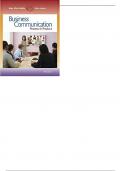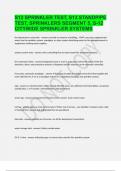Exam (elaborations)
Test Bank For Business Communication Process and Product 7th Edition by Mary Ellen Guffey
- Institution
- Business Communication - Test Bank
Chapter 1—Effective and Ethical Communication at Work MULTIPLE CHOICE 1. Communication skills are a. not as important in technical fields. b. critical to effective job placement, performance, career advancement, and organizational success. c. required only for high-level positions. d. not a...
[Show more]




